Staff Retirement News
- Jim Urquhart
-
After 40 years at the University, Jim Urquhart, Technician at the School of Psychology is retiring.

On his retirement, Doug Martin, Head of the School of Psychology, said: "Jim Urquhart is a psychology technician who has made outstanding contributions in supporting the scientific endeavours of staff and the education of students in the School of Psychology for more than four decades. Jim's skills, experience and knowledge have allowed many of us to undertake research that we otherwise would not have been able to do. He has been as much a psychological scientist as any of the other researchers in our School.
"No one in the University has better epitomised the phrase 'going above and beyond'. Jim always said 'yes' to every request made of him, no matter who made the request or whether it was his job to fulfil it. This meant Jim was often to be found literally running between offices and labs responding to people's requests. As the saying goes in our School - 'If you want something done, ask Jim!'
"Jim has treated everyone he encounters the same; undergraduates, PhD students, colleagues and senior management have all received the same friendly dedicated service. Jim always showed great empathy and a selfless sense of fairness and natural justice. For example, during School-wide discussions, rather than just thinking of things from his own pint of view, Jim always thought of others and provided a voice to represent the interests of those not in the room.
"Jim has also been at the social heart of our School. He was a friendly welcoming face to everyone who met him in the staffroom. He organised countless School-wide social events, including the School Christmas do, movie nights, cheese and wine evenings, and even a pie tasting!
"Jim will be sorely missed and the William Guild Building will not be the same place without him.”
- Janice Montgomery
-
There's a saying that if you can find a job that you like, you'll never work another day in your life. For Janice Montgomery,
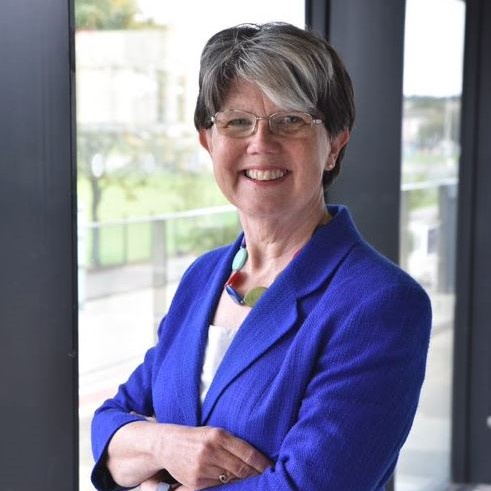
It was a serendipitous meeting to discuss her own career ambitions which resulted in Janice's appointment to the team back in December 2003.
“I was working for the Education Department at Aberdeen City Council while at the same time being back at the University as a mature student doing a second undergraduate degree. When it came to graduation I knew I wanted a bigger challenge but wasn't quite sure what it should be,” she said.
“I made an appointment with the Careers Service and spoke to Regina Jaschke, who suggested I might be quite a good careers adviser. I believe that God directs our lives and I clearly went in at just the right time as, as it happened, there was a vacancy in the team at the University.
“I am an example of the type of work that the team does. Regina was very kind and helped me with the application process and working on my CV, as well as offering guidance on the interview. To my utter astonishment I was offered the job.”
The University backed Janice in studying for her Postgraduate Diploma in Higher Education Careers Education, Information and Guidance qualification over the next three years.
“I loved every minute of the course and I'll always be grateful to the University because it gave me the theoretical and pedagogical background to do the job that we do, well. I've also had the most marvellous colleagues all the way through. Not just in the Careers Service at Aberdeen but nationally. I've been allowed to work on different committees and been a trainer for the Association of Graduate Careers Advisory Services (AGCAS) teaching on some of the courses so that other people could quality as careers staff.
“Over the years I've also been a quality assurance assessor, helping other careers services evaluate where they are, and working with the National Learning Committee, supervising the qualifications and training of about 4,000 staff in careers services across the higher education landscape in the UK and making suggestions on how the training can be improved and delivered.
“So I've had the most incredible time. I'd never have guessed when they offered me the job that I'd have the opportunities to travel and to contribute and to work with people across the UK in the way that I have. It has been absolutely amazing.”
Janice's contributions were formally recognised in 2022 when she was awarded the Association of Graduate Careers Advisory Services' Presidents Medal.
“It isn't given as a team award but that's the way I look at it because I couldn't have achieved what I did if it weren't for my colleagues who generously covered for me when I was away on a course or teaching at another university.“
It's clear that Janice doesn't just like the people she works with, she also loves the people she works for.
“Working for students is a rare privilege. Over the years I've worked with all different sorts of students but the main ones have been Law and Biological Sciences students, so very different caseloads, very different employers, very different needs.
“We have so many brilliant students in Aberdeen but just because they are academically brilliant doesn't mean they necessarily know what they want to do or how to present themselves well to employers. One of the sheer joys is working with students who occasionally undervalue their own abilities or are very uncertain about their future path and help them move from where they are to where they want to be.
“We've been very fortunate over the last two years as the University has developed its own Enterprise and Employability Committee ensuring that employability has very much been front and centre of the Aberdeen 2040 strategy. The commitment that many of the academics that I've been fortunate enough to work with, has also been wonderful to see. They are really invested, both in the academic excellence of their students but also in what happens when they leave university. They truly value the students and they want them to do well in life.
“I'm sure there's now graduates out there that all of us have helped, that are leading their companies, their law firms and contributing well to society. It's lovely when you feel that your working life has made a difference and I'm blessed to be able to think that mine has.”
After such a fulfilling career, what does the future hold for Janice?
“Part of me is excited at the prospect of doing something different and part of me is sad to be leaving a wonderful job and a brilliant team and wonderful opportunities that I've had so it's a real mix,” she said.
“I'd like to spend more time getting healthier so you may see me more often at the Sports Village! I'm involved in the Aberdeen Orpheus Choir but I'd like to do more musical things. I'd also like to travel and spend more time serving God in our local church, Catalyst Vineyard.
“Whatever the future holds, I hope it will be useful and varied and I'll still be able to go on using my abilities outside the University context.”
Janice will be waving a fond farewell to the working phase of her life with a celebratory ceilidh with colleagues, friends and family at Aberdeen's Beach Ballroom next month.
- Joyce Michie
-
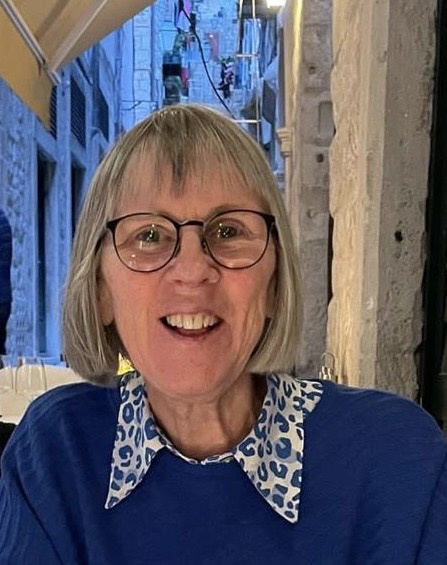
When she leaves the School of Education for the final time this month, she will have clocked up an impressive 48 years of helping future generations of teachers and counsellors complete their studies.
“In many ways I can't believe that I'm retiring,” said the 66-year old. “It doesn't feel all that long ago that I was just starting out. I've made some amazing friends over the years and the prospect of not seeing them every day is very sad, but all good things come to an end.”
Joyce joined Aberdeen College as an office junior in July 1974 at the age of 16 just three week after leaving the city's Hilton Academy. Quicky mastering typing and shorthand she then started climbing the career ladder, graduating to clerical assistant before broadening her skills by moving around different departments.
But it was the merger with Dundee College to become Northern College in 1987 that proved to be a turning point.
“I began working face to face with students and it was just brilliant,” said Joyce. ”I describe myself as being a fixer, so helping solve their problems, looking after them was a perfect fit for me.”
Northern College became part of the University of Aberdeen in 2005 and Joyce, along with others, relocated to the MacRobert Building where she quickly become an invaluable member of support staff.
“I was a secretary, working in B.Ed Primary for the Deputy Programme Director before I took over the Counselling Skills remit in 2014, and that's what I've been focused on for the past 10 years as School Administration Assistant.
“The students are the heart of the job for me but in this role you work very closely with lots of other teams. I've developed brilliant relationships with colleagues at the Student InfoHub, e-Learning and IT Service teams in particular. Some people call it networking, I call it making pals.
“I'm a big believer in the importance of speaking to people and interacting with them face to face. It's something I've done my whole career and encourage everyone I interact with to do the same.
“I'm glad to have been part of the team at the School of Education and, I hope, to have been a positive influence. I know I leave having made some friends for life.”
Never one to sit on her laurels, while retirement might mean more time to relax, Joyce plans to spend time with her son, daughter and one-year-old granddaughter, as well as hitting the road with running group Jog Scotland.
- Iain Gibson
-
Iain Gibson is retiring from the University at the end of September after a long and illustrious career.

Professor Iain Gibson graduated with a first-class honours degree in Chemistry from the University of Aberdeen in 1991, and completed a PhD in Materials Chemistry, also at Aberdeen, between 1992 and 1995. Iain then moved to Queen Mary, University of London in 1996 to a post-doctoral position at the UK Research Council-funded Interdisciplinary Research Centre (IRC) in Biomedical Materials. During this time, Iain co-founded a medical device company called Apatech Ltd in 2001, providing insight into the process of commercialising basic research towards clinical applications.
In 2002, Iain returned to Aberdeen to work with Professor Colin McCaig on a project that aimed to build biomaterials research at the University. In 2004 Iain was awarded a prestigious 5-year UK Research Council-funded Fellowship that allowed him to establish his own research group. This was held as a 50:50 split post between the IMS and the Department of Chemistry, which reflected the interdisciplinary nature of his research.
Iain was promoted to Reader in 2009 and to a Personal Chair in 2011. His interdisciplinary research and teaching activities continued between the two campuses, with increased activity to commercialise research from his lab on a new synthetic bone graft material for orthopaedic surgery. After a 30-month Scottish Enterprise-funded project, in 2011 Iain created a University spin-out company called SIRAKOSS Ltd, which also used space in Meston in Old Aberdeen and in Polwarth. After securing Series A investment in 2014 and a number of INNOVATE UK grants, the company grew and was able to develop the technology to the point that SIRAKOSS received FDA approval for the marketing of their bone graft material for the US market in 2020.
SIRAKOSS was acquired in November 2020 by OssDsign, a Swedish medical device company. It retains a presence on campus with office and lab space in Polwarth and two former-Sirakoss employees. The SIRAKOSS-developed technology was launched in the US market by OssDsign in August 2021 and in May 2023 they reported that 1,000 patients had been treated with their bone graft.
Amongst various administration roles, Iain was a postgraduate coordinator in the IMS from 2011-2017, and Go Abroad Tutor for the School of Medicine, Medical Sciences and Nutrition from 2008-2023. The latter involved advising over 300 incoming exchange students from the USA, Canada, Australia, and Hong Kong on their course selections during their time at Aberdeen, and over 80 of our undergraduate students who have gone overseas on exchange.
A common thread has been involvement in translational research and teaching, and this has included industry-funded research, commercialisation of research, contribution to biobusiness teaching, involvement in various committees and advising colleagues in technology transfer/commercialisation. Iain has served on the ONE Life Sciences Board of Opportunity North East (ONE) since 2021, which aims to grow the life science sector in the north-east.
We would like to invite you to record your good wishes https://www.groupgreeting.com/sign/5e18074238c2aa6
There will be refreshments served in the IMS Atrium 3pm, Friday 22 September - please RSVP by 18 September to Debbie (debbie.coutts@abdn.ac.uk ) for catering purposes.
- Isobel Cameron
-
Dr Isobel Cameron will be leaving us at the end of September. Isobel has worked with the University of Aberdeen for an
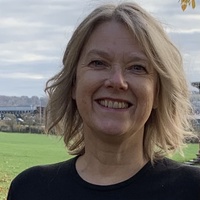
After studying an MA in Psychology and PG Dip in Psychometrics, Isobel began her career in 1991 as a researcher at HSRU, going on to conduct further research in the Department of Mental Health and Department of General Practice. In 2005 she joined Professor Ian Reid's research team at the Clinical Research Centre, Royal Cornhill Hospital where she gained her PhD on the recognition and treatment of depression in primary care. In 2009 she became a lecturer in Mood Disorders. From then on, Isobel contributed widely to teaching in SMMSN. In relation to the MBChB programme she has been Year 3 Lead, Assessment Lead, Lecturer, Supervisor in student selected components, Tutor on the Medical Humanities course and Electives Advisor. She has course co-ordinated and taught on the MSc in Clinical Education Programme and been a Personal Tutor. She supervised several PhD and MSc students.
In recent years Isobel's research focus moved from mental health to fairness in assessment and healthcare education when she conducted research in psychometric examination of healthcare assessments and in fairness in assessment in post graduate medical education.Everyone who knows and has worked with Isobel is going to miss her excellence in what she does and her calm, collegiate and supportive approach.
- Gordon McEwan
-
Professor Gordon McEwan is retiring on 31 August after an impressive 30 years working at the University of Aberde

Then followed the move to Aberdeen in 1993 as a Lecturer in Biomedical Sciences where his passion for teaching flourished. He was promoted to Personal Chair in 2014 in recognition of his leadership and many contributions in this field. Gordon has held multiple leadership roles in teaching including Programme Co-ordinator for BSc Biomedical Sciences (Physiology), and holding the role of Director of Teaching in the School of Medical Sciences from 2003 until 2015. After restructuring of systems within the University created the School of Medicine, Medical Sciences and Nutrition, he was appointed Deputy Director of the Institute of Education in Healthcare and Medical Sciences and continued as the Director of Teaching for the Medical Sciences Programmes.
Throughout his career he has adopted a student centred approach and maintains a very high personal teaching load. In addition, he has remained committed to supporting others, mentoring and supporting many colleagues in their teaching development. Under his leadership the University of Aberdeen is currently ranked first in the UK in the NSS Anatomy, Physiology and Pathology category and rarely ranks outside the top five. The feedback on Gordon's teaching is consistently outstanding and the envy of many. Although we wish him a wonderful retirement, we know that Gordon will be sorely missed by both students and colleagues.
- Bernadette Connolly
-
Bernadette Connolly is retiring from the University at the end of July after a long and illustrious career having joined the University as Senior Lecturer in 1999.
In 2007 Bernadette was appointed Director of the Graduate School in the College of Life Sciences and Medicine, a post she held until shortly before the restructuring of the Colleges in 2016. In 2011, as part of that leadership role, working with the Universities of St Andrews, Dundee and Edinburgh, she led Aberdeen's successful application for a 3-year BBSRC doctoral training programme, EASTBIO, and its 5-year renewals in 2015 and 2020. This underpinned EASTBIO' s expansion to become one of the largest BBSRC doctoral training units in the UK. Since 2012, 105 PhD students have graduated from Aberdeen's EASTBIO programme, a measure of its success in a highly competitive DTP funding environment.
Bernadette was promoted to personal Chair in 2013, in part a recognition of her leadership of post-graduate research at the University. Following her Director of Graduate Studies role with the College, in 2015, Bernadette was appointed to the role of Deputy Director of the IMS, a leadership role she continued until 2021.
In parallel with her management roles, Bernadette has led a successful research group, and continued to lead elements of PGT teaching in MMSN, including the initiation of new, successful Masters degrees in Industrial Biotechnology, and Masters by Research. Together, her 23-year career at Aberdeen, her 14-year record of University leadership, and of achievements across the academic portfolio, are all a testament to her professional qualities and depth of contribution to the University of Aberdeen.
We would like to invite you to record your good wishes online .
- Jan Walker
-
Jan started as a graduate trainee in 1983 with the Department of Zoology in insect physiology, followed by a move and
.jpg)
Throughout her career she has worked in internationally renowned facilities with many high-profile researchers and in several cases saw them develop from PhD to chair and onto senior management roles in the University.
She could often be seen with her overalls or lab coat on, getting stuck into clearing labs and areas, or dealing with cleaning following incidents in her areas of responsibilities. Her developments and improvements in facilities and laboratories have seen substantial benefits to a multitude of users including students, technicians, academic teachers and research staff across the University. Jan's personal commitment to sustainability has seen both Schools benefit from reduced waste and improved recycling - a flag she has flown and persuaded us all with. This also saw a reduction in costs to Schools by reusing equipment and furniture.
Jan has worked closely with most University services - in fact it would be easier to name the ones she hasn't worked with over her 35 years! Perhaps most notably, she worked with Estates & Facilities for the buildings improvements she helped to lead, and the Health, Safety & Resilience team where her passion for health, safety and wellbeing contributed to new policies and procedures. She could be relied on not only in her management role but also in her voluntary role as H&S Representative for Unite the Union.
- Rita Briede
-
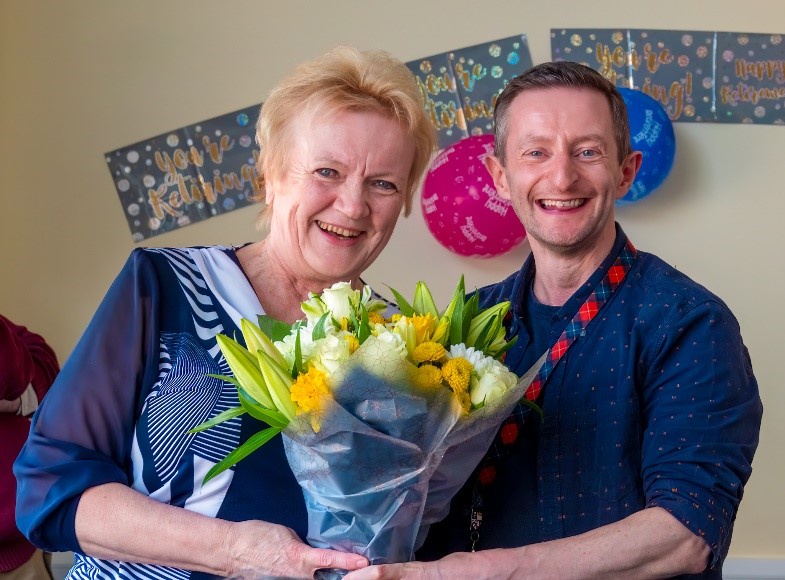
Rita started in chemistry 2005 to support 1st year undergraduate practical teaching. Over her years she has probably helped around 8000 students with 1st year, S6 lab days for Advanced Higher pupils, summer schools and outreach activities.
She found a way to engage with first year students in a non-academic way when she introduced the map of the world to the lab and asked “her” students to place a pin on the map showing where they came from. Over the years this map has shown over 60 nationalities and is often mentioned by students who got to pin their flag in the map.
We all wish her a happy and healthy retirement.
- Gordon Stables
-
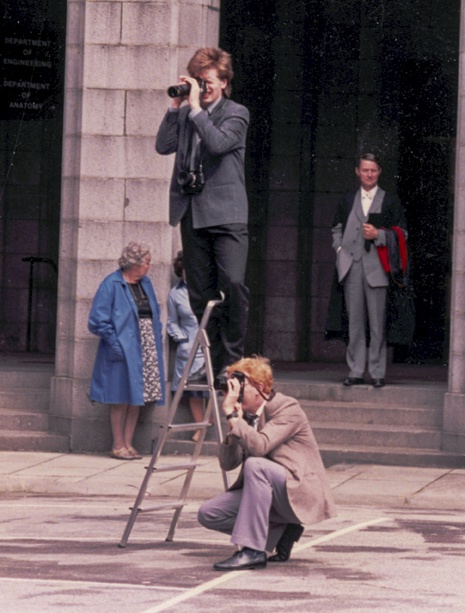
Gordon joined the University's Geography department in 1984 as a trainee technician. He worked initially for Professor William Ritchie under the supervision of Chief Technician Jim Livingston. His main tasks included working on the anthropogenic changes to coastal and nearshore areas and photographing the Scottish coastline.
He then joined the then Queen Mother Library where his duties included printing George Washington Wilson prints from the original glass negatives and providing the E6 processing for the entire University.
Gordon's next move was to the Department of Medical Illustration, then led by Director Keith Duguid. He received training from medical illustrator Nigel Lukins and in 2005, he was made head of graphics / illustration and team lead for the medical and public relations photography unit. The department has since grown and covers all areas of the University while still maintaining core NHSG services.
Gordon said: “It's been a pleasure to work for the University of Aberdeen and NHSG. It has enabled me to work alongside such talented colleagues and I will miss their camaraderie.”
Brian Henderson, Director of Digital & Information Services, said: “Gordon's talent and open, friendly manner will be much missed by his many colleagues and friends here at the University. From covering events like May Fest to working closely with Schools, Gordon has had a rich and varied career which has been a tremendous service to the University and NHS Grampian.
“I'd like to thank Gordon for his professionalism, dedication and hard work and wish him a long, happy and healthy retirement.”
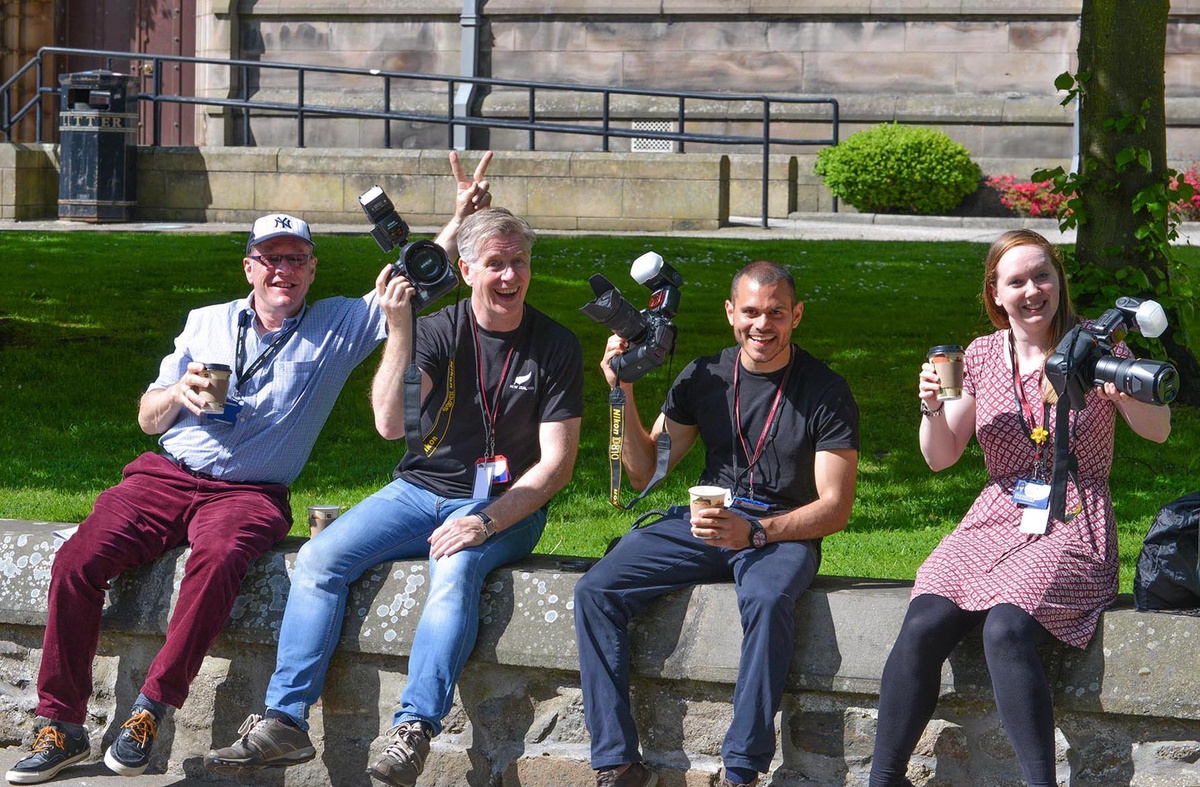
- Couple retire after combined service of 74 years
-

A couple who have dedicated a large part of their working lives to the University are to retire after a combined service of 74 years.
During their years with the University, Kevin and Christine Mackenzie have seen five Principals, five University Secretaries, six University logos, and have carried out numerous different roles.
Kevin joined the University in 1979 aged 17 as a trainee histology technician in the Department of Anatomy. After 10 years he moved to Plant Science for a year then Zoology to look after the Electron Microscope Unit. After 15 years, he moved to the IMS and from 2008 to the present, he has been the Microscopy and Histology Core Facility manager.
Christine joined the University in 1989 as a graphic designer in the Central Printing Service. In 1998, she joined the nascent Web Team as a web designer, and in 2004 moved to become documentation officer in the IT Training Unit. Over the following 10 years Christine's role and remit flexed and adapted to the restructuring of Library and IT Services. In 2014, she became leader of the IT Training and Documentation Team, and in 2016 her line management role was extended to include the Toolkit Team.

Kevin added: “The real buzz for me is from giving advice, training people, and seeing what they go on to achieve. Working for the University is a bit like working for a large family. When you have been here as long as we have you get to know people really well and it is inspiring helping people to achieve their goals.”
Debbie Dyker, Director of People at the University of Aberdeen, said: “I would like to thank Kevin and Christine for their 42 and 32 years dedicated service respectively to the University. Their knowledge and expertise will be sorely missed by their many colleagues and friends.
“They are a credit to the University, and I am delighted that they leave armed with many fond memories from the numerous departments and projects they have contributed to over the years.
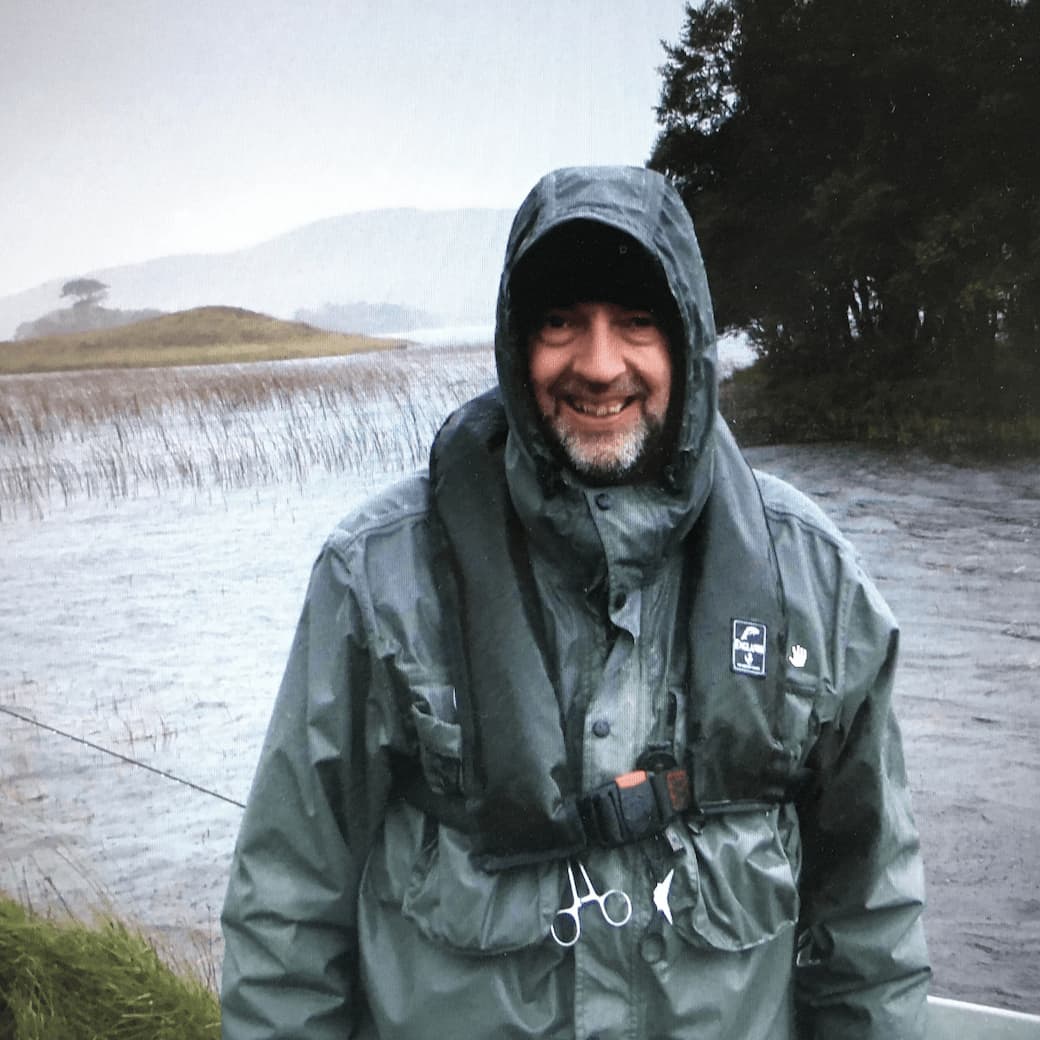
“Although perhaps best known for her current role in IT training and documentation, Christine's previous roles have seen her as the 'go-to' person for digital design creation and advice, both within IT and across the University. She always has time to answer questions and has been a fantastic mentor and support to many colleagues.
“Colleagues will miss Kevin and Christine's enthusiasm and can-do attitude, but we all wish them both a very long, happy and healthy retirement.”
Kevin and Christine's finish work at the end of this year, after which they plan to pursue their many and varied interests in retirement. From fly fishing to wild swimming, and live music to travel - when the world opens up again, of course!
- Sue Barr
-
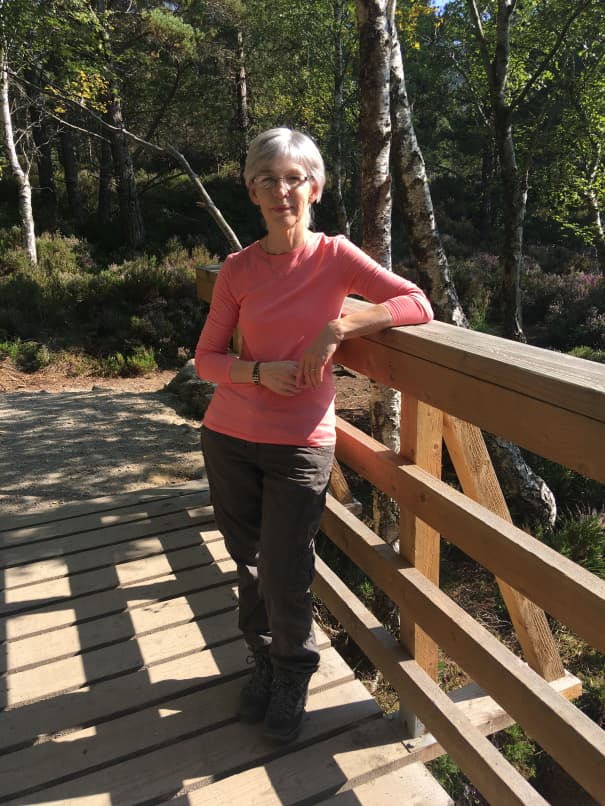
Sue organised and ran the UoA ScotPIL training course for those who want to work with animals and was a massive help when writing new project licences, commenting on drafts and giving advice on models and monitoring.
In the words of one staff member she always made time if you had questions about anything (including advice about pets - thanks Sue!). Her cheeriness and smiles will be particularly missed. For all who came into contact with her, Sue's professional skills and experience have been invaluable in helping to develop the services, good practice and relationships over the years. Her last day was Wednesday 8 December.
- Professor Graeme Murray
-
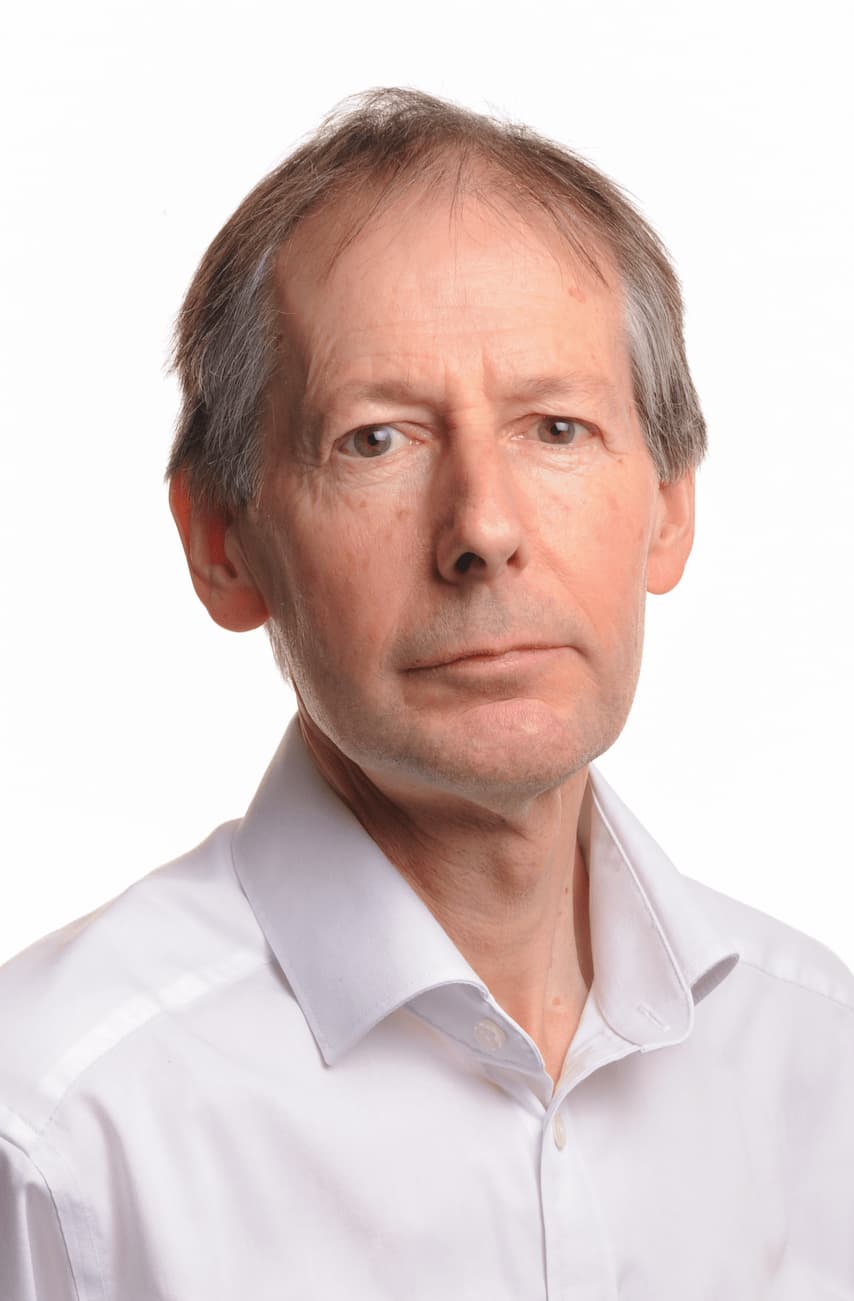
Graeme completed his medical degree and PhD at the University of Aberdeen and has had a long and successful 37-year career with the University as a clinical academic and with NHS Grampian in an honorary position. Graeme was appointed to a Clinical Senior Lecturer and Honorary Consultant in Pathology in 1994 and to a Personal Chair in 2002.
We are fortunate that Graeme chose to remain in Aberdeen following graduation and specialist training, during which time he has made a major contribution to both organisations.
Amongst a broad range of activities, Graeme has been a stalwart in delivering Pathology teaching within the medical curriculum and has been hugely supportive of students. He has supervised many PhD students and run a research team, investigating bowel cancer to understand how this common type of cancer develops and progresses. He was the Clinical Lead for the Grampian Biorepository since 2011 and, in his Consultant Pathologist role within NHSG, he was the Lead Consultant Pathologist for gastro-intestinal, hepatobiliary and pancreatic pathology.
Graeme has been a prolific collaborator, with international as well as Aberdeen based researchers, bringing his clinical expertise to many partnerships on grants, in supervising PhD students and medical student projects. He has always been an enthusiastic supporter of the Pathological Society of Great Britain and Ireland, one of the leading academic pathology organisations, attending and presenting at many meetings as well as serving as Honorary Treasurer.
To crown off his career, Graeme was appointed to the prestigious Regius Chair of Pathology in 2019. It was founded in 1882 and is the only Regius Chair of Pathology in the UK. Also in the past couple of years he was invited to deliver the Doniach Lecture of the Pathological Society of Great Britain and Ireland. This accolade celebrates the lifelong contribution of a Senior member of the Society to the science of Pathology and to the Scientific activity of the Pathological Society and illustrates his respect and stature in the pathology field. He was the first Aberdeen pathologist to receive this award.
I know that I speak on behalf of his colleagues and students in wishing him a long, happy and healthy retirement.
Professor Siladitya Bhattacharya
- Professor Kath Shennan
-
Kath Shennan retired on 31 August 2021 after 27 years' service to the University.
Kath joined the University in 1994, as a lecturer in the Department of Molecular and Cell Biology, at that time located in Marischal College. There Kath set up her research group to study the secretion of polypeptide hormones such as insulin, and specifically mechanisms by which cells direct proteins into the regulation secretory pathway. This was soon followed by a move to the newly built IMS on the Foresthill campus. There she was promoted to Senior Lecturer in 2003 and to a Personal Chair in 2014. Alongside her research, Kath, has been a major contributor to teaching biochemistry across all undergraduate levels, both as a lecturer and course coordinator, and to research training through the supervision of many PhD students and research technicians.
As many of you will know though, Kath's contributions have not been confined to research and teaching within the School. In 2010, she took on the role of Admissions Selector for the BSc Science degrees, a post she held until 2019. She was Convenor of QAC from 2011 and became Dean for Quality Assurance/Enhancement in 2016. To all of her roles, Kath has brought knowledge, wisdom, dedication, patience and, above all, a voice of reason.
Colleague, teacher, tutor, mentor, advisor, counsellor, friend. We will miss all the 'Kaths' but wish her well and send her off with the very best wishes for a long and joyful retirement.
Professor Siladitya Bhattacharya
- Jim Wyllie
-
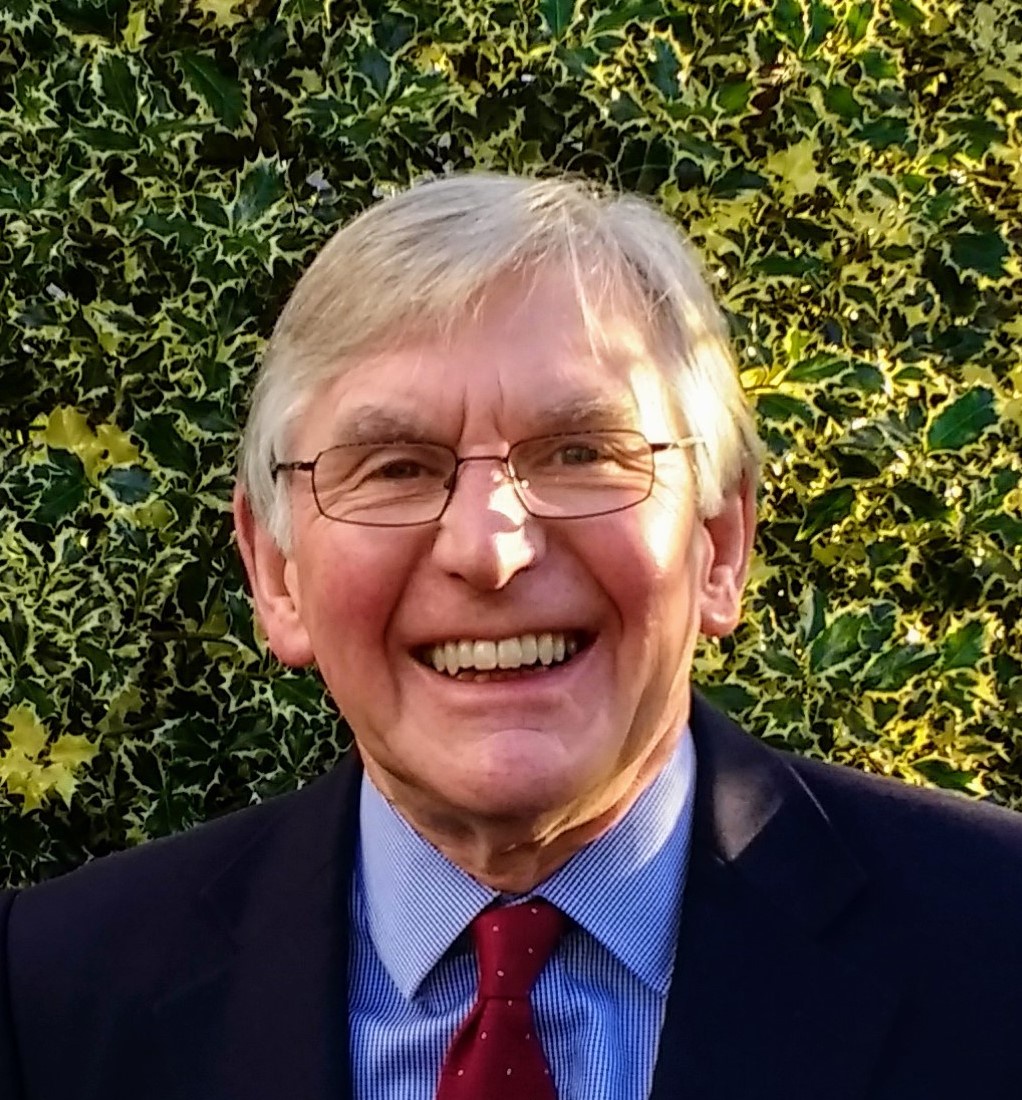
During those 40 years, a great deal has happened in the world of politics and IR - the Thatcher era and legacy; the Falklands War; the end of Apartheid; the demise of the Soviet Union and the end of the Cold War; almost constant turmoil in the Middle East; and most recently the rise of populist movements across the globe including the phenomena of Trump and Brexit. For successive generations of students and young scholars, Jim has been pivotal in helping them understand these globally significant events. He has challenged and nurtured them - helping them develop critical thinking skills and challenging them to develop and defend their analysis of these global trends. Those students have gone on to apply that expertise in professional settings around the world, in many cases involved in responses to those events in areas such as academia, the military, international organisations, and civil service departments in the UK and further afield.
Jim has contributed to the University in many ways but there are two contributions of particular note. First, since 1979 he has been Director of the MLitt/MSc Strategic Studies; he has sustained, adapted and expanded this successful programme over four decades and established a world-wide reputation. Over the years this has evolved to include a suite of Master's degrees: Strategic Studies, Strategic Studies and International Law, Strategic Studies and Management, and Strategic Studies and Energy Security. Jim has steered and 'owned' these programmes, contributing the majority of the teaching and supervision and providing continuity throughout.
Jim's other major (and, at Aberdeen, incomparable) achievement has been in doctoral supervision, with over 25 successful candidates, including eight in the past four years. Very few academics can boast such success, both in the numbers of supervisees, and in the nature of the relationships he has developed with students (as is evidenced by the number of bottles of whisky he receives as gifts!). Many past doctoral and Master's students are now in positions of great responsibility, for instance as senior public servants in the FCO, MOD and national intelligence agencies in the UK and overseas; high performing academics in the UK, US and at other universities around the world; leading security officials for international banks; key staff for blue-chip risk assessment companies; and senior officers in the UK and other national militaries. These are the words of two of Jim's former students:
“For our generation of strategic studies students, having studied as undergraduates during the turmoil of the early 1990s, we wanted a postgraduate course that could help us begin to make sense of the emerging world order and consider the new challenges we were going to face in our preferred professional arenas. Jim's Strategic Studies course did just that - helping us begin to identify a new type of trans-national security challenge, query what power now meant after the demise of a superpower, and to reflect on whether history had really ended.” (Fraser Lovie, who graduated with a Master's in 1995)
“'My Strategic Studies class used to joke that Jim had a cult of personality, but the truth is simpler than that. He inspires intense loyalty and affection in his students because he never offers anything less in return.” (David Walsh, who completed a PhD in 2018)
Jim's other contributions are manifold - there are too many to list fully - but include highly respected academic publications; University committee work; consultancies over 30 years for UK MOD and FCO; taking the University of Aberdeen name around the world, delivering lectures in South Korea, Hong Kong, Oman, UAE, Jordan, Cyprus, Switzerland, Germany, Norway, Poland, Gibraltar, Canada and the United States; for ten years, delivering the annual 'European Security' lecture at the Royal College of Defence Studies, London; and dabbling with real-world politics.
His place within the department is a special one. Words used to describe him as a colleague include professional, reliable, dedicated, supportive, mischievous and argumentative (in a good way). As Head of Department, I cannot express how thankful I have been for his kindness, help and professionalism. And all these characteristics have been evident even at times when he has faced great personal challenges - most recently a knee operation which did not stop him undertaking any of his departmental responsibilities. Previous Head of Department Mervyn Bain (now Head of School) writes:
“The completion of 40 years continuous service at the University is a fantastic achievement and throughout this time Jim has adhered to the ethos of investing time with students and colleagues. This is evident in the popularity of his programmes, courses and number of PhD students. It is a highly rare occurrence to pass Jim's door without seeing him spending time with students. Personally, I would also like to thank Jim for his counsel which I have found invaluable during my own time at the University.”
All of this has been done with a certain inimitable style. Jim is known for his independent and challenging views, not necessarily the most liberal and mainstream in an academic context. Which is no bad thing, as he confronts the lazy thinking and analysis of students and staff. He forces us to understand events like the election of Trump as US President and Britain's departure from the EU, not simply express despair that these events are happening. Stuart Durkin from PIR observes: “Even if you don't agree with Jim's analysis, there is a rigour and quality to what he does and he is not afraid to challenge received wisdom. I only hope his new knee bears up, given that he opted to have it done under the Communist system.” All in all, Jim has served the University with integrity and professionalism, for which his students, colleagues and friends are very thankful.
Lynn Bennie, Head of Politics and International Relations, January 2019.
- Carol Wallace
-
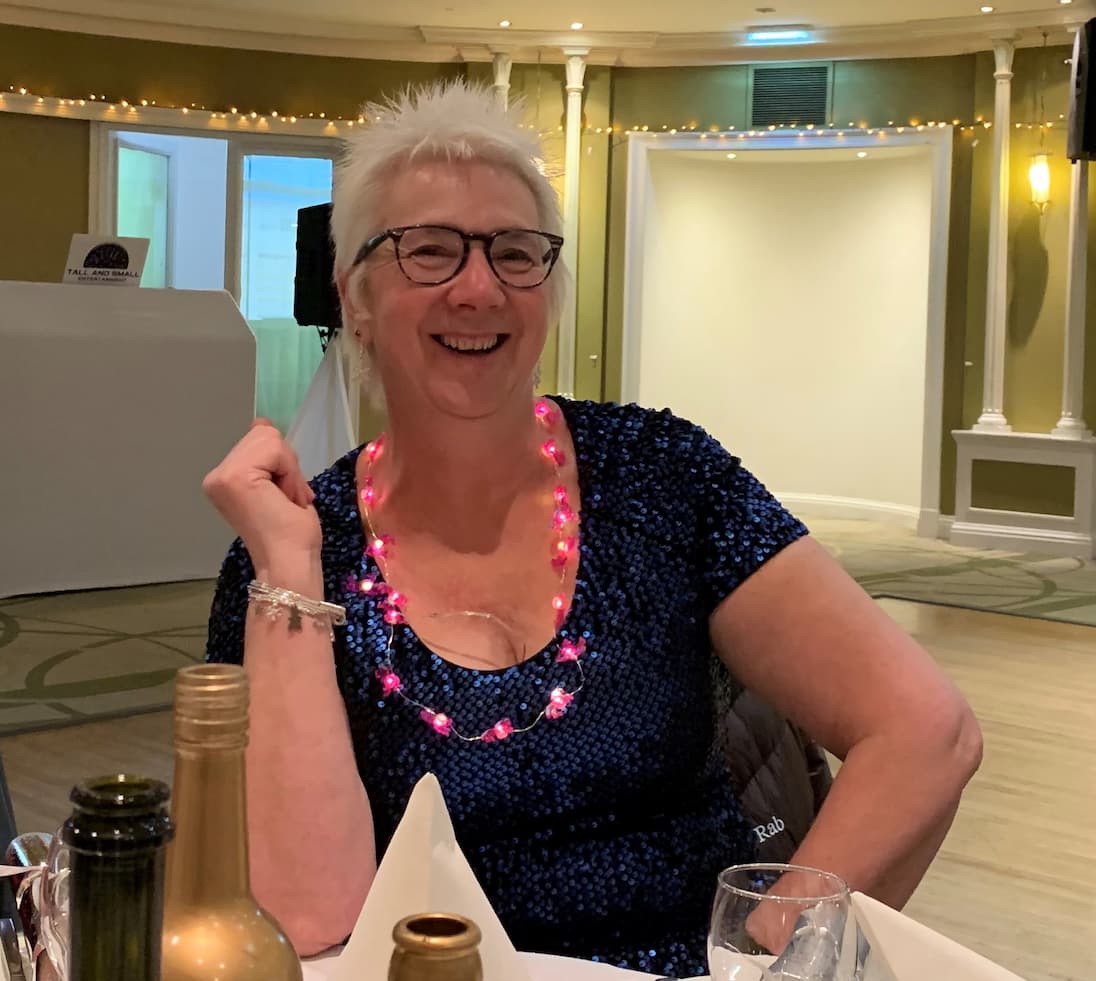
Carol joined the University in March 1997, working as a technician in the Department of Ophthalmology. She then went on to work with Gordon Brown in the Aberdeen Fungal Group and prior to her retirement was carrying out vital COVID -19 research within Nikki Mutch's group, resulting in an extensive and well cited publication list.
Carol was extremely resourceful and able to adapt. This was particularly clear when she successfully balanced her technical role in IMS with that of an administrator's role in the Institute for Education in Medicine and Dental Sciences. Over the years, Carol has passed on her knowledge and skills to countless students and post docs, as well as fellow members of staff and we have all benefitted from her patience and kindness.
Along with her excellent lab work, Carol was always very willing to help organise and to participate in many social events and we will miss her organisational skills and her willingness and ability to party!
Carol has enjoyed many memorable years at the University and can regale with many a tale. She is an excellent work colleague and friend and will be greatly missed by us all and in particular at coffee time in the Atrium. We wish Carol all the very best with her future plans.
